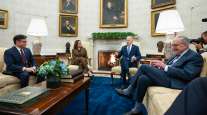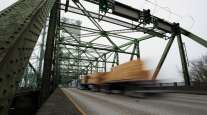Senior Reporter
House Democrats Outline Five-Year, $760 Billion Infrastructure Proposal

[Stay on top of transportation news: Get TTNews in your inbox.]
WASHINGTON — House Democrats’ attempt at transforming the country’s Eisenhower-era transportation system came in the form of a five-year, $760 billion proposal that would necessitate input from the president to ultimately fund major programs.
In an outline unveiled Jan. 29 on Capitol Hill, Democrats expressed the need to repair and modernize highways, bridges and multimodal transportation networks while emphasizing ongoing efforts that promote severe-weather resilience in infrastructure projects.
Policymakers are aiming to proceed with a program meant to focus on “at-risk” transportation systems, invest in evacuation routes and enhance rebuilding efforts after natural disasters, such as earthquakes. They also would seek to ensure severe-weather resilience becomes a requirement in federal highway planning, as well as the project selection process. Attention would be paid to life cycle and long-term asset performance.
Dems Infrastructure 2020 by Transport Topics on Scribd
Transportation Chairman Peter DeFazio (D-Ore.), whose committee is expected to consider a climate-centric highway policy measure this year, expanded on his caucus’ transformative viewpoint at an event that featured the chairmen of committees with jurisdiction on infrastructure matters, members of the transportation panel and House Speaker Nancy Pelosi (D-Calif.).
“There’s so many ways we can deal with the climate crisis by solving our congestion and infrastructure crisis,” DeFazio explained. “We’re moving forward. We presented a framework. The framework — we’re now drafting the details of that framework, and, you know, I’m looking forward to putting America on a sustainable path to a better transportation future.”
The House’s highway measure would update a 2015 federal highway law that expires in September. Pelosi did not specify a timeline for proceeding with the highway bill.
“We are hoping that we will have the support of the Republicans and the president of the United States. We had hoped that all along,” Pelosi told reporters. “Don’t worry about the timetable. Just rest assured that when we’re ready we’ll come to the floor. And it won’t be soon. We’re not talking about next week or something.”
In part two of a two-part exploration of autonomous technology today, our latest RoadSigns podcast revisits conversations with Chuck Price of TuSimple and Ognen Stojanovski of Pronto.ai. Hear them discuss a palatable Level 2 version of trucking autonomy. Listen to a snippet above, and to hear the full episode, go to RoadSigns.TTNews.com.
Specifically under the outline, $329 billion would be dedicated for highway programs, $105 billion for transit systems, $86 billion for investments in broadband, $60.5 billion for wastewater and other water infrastructure programs, $55 billion for rail networks, $34.3 billion for clean energy programs, $30 billion for airports, $25.4 billion for drinking water programs, nearly $20 billion for harbors, $12 billion for public safety communication systems and nearly $3 billion for brownfield restoration programs.
Additionally, the outline called for investing in multimodal freight systems, establishing stricter tolling and congestion pricing standards, and increasing grants to states via agencies such as the National Highway Traffic Safety Administration and the Federal Motor Carrier Safety Administration.
Democrats claimed that, if adopted, the proposal would create about 10 million jobs.
Similar to highway legislation a Senate committee advanced last year, Democrats stopped short of endorsing a long-term approach that would be used for funding highway programs. Instead, the outline insists Democrats are “working toward responsible, bipartisan pay-fors.” And, according to the outline: “President [Donald] Trump must come to the table with real proposals to raise the necessary revenue and resume a bipartisan pay-for conversation with Congress.”
At a Ways and Means Committee hearing soon after the outline was unveiled, Chairman Richard Neal (D-Mass.) indicated Trump’s team signaled interest in infrastructure policy. “I recently spoke with [Treasury] Secretary [Steven] Mnuchin, and the administration remains supportive of a robust infrastructure package,” Neal said. “I look forward to working with the White House and my colleagues to develop a robust infrastructure package this year that will invest in our communities and our nation.”
The Ways and Means panel has jurisdiction over the Highway Trust Fund, an account backed by insufficient revenue from the federal fuel tax. The fund assists states with highway projects.

Graves
Missouri Rep. Sam Graves, the transportation committee’s top Republican, has promoted establishing a fee for the miles motorists travel. Revenue from that fee would assist with funding highway programs. After learning of the Democrats’ proposal, Graves touted bipartisanship. As he put it, “I expect to play a constructive role in the development of infrastructure bills before us this year, including expected surface transportation and water resources legislation. Any serious effort toward enacting infrastructure legislation must incorporate Republican principles as well. The time for partisan posturing from House Democrat leadership is over.”
Groups supportive of the Democrats’ recent push to modernize highways and enhance freight connectivity included American Trucking Associations. The federation proposed the Build America Fund, which would generate $340 billion in about 10 years through the adoption of a 20-cents-per-gallon fee on motor fuels collected at the wholesale rack. ATA explained revenue would be phased in over four years at 5 cents annually.
“Each additional day that we short our nation’s roads and bridges of needed funds, more lives are put at risk, more hours of the day are lost sitting in traffic and more damage is done to the environment,” ATA President Chris Spear said.
Last year, discussions between Pelosi’s team and Trump over the terms of a $2 trillion infrastructure plan collapsed due to political tensions. Each side went on to blame the other. This year, the White House has not announced a plan on infrastructure policy. In the Senate, the tax-writing committee has not addressed the Highway Trust Fund’s looming insolvency.
Want more news? Listen to today's daily briefing:





